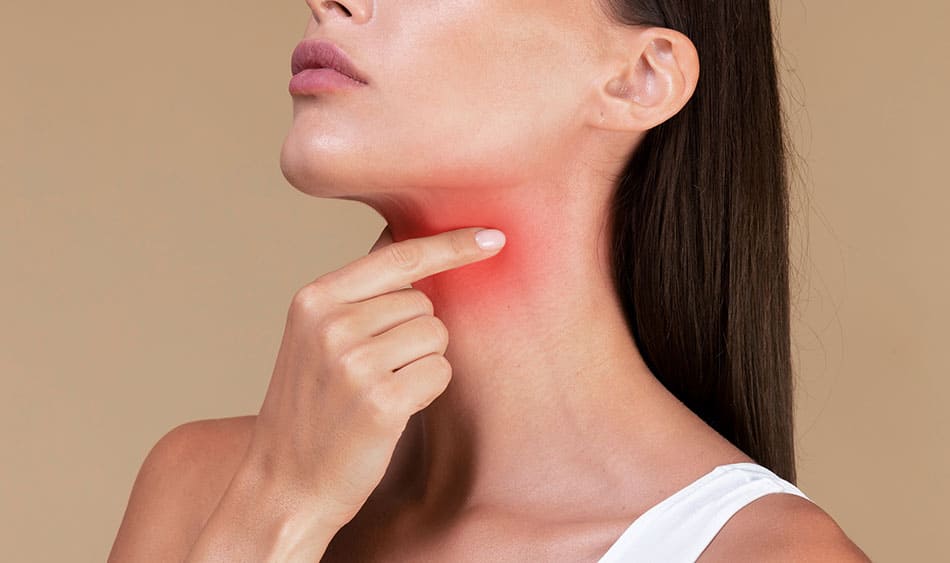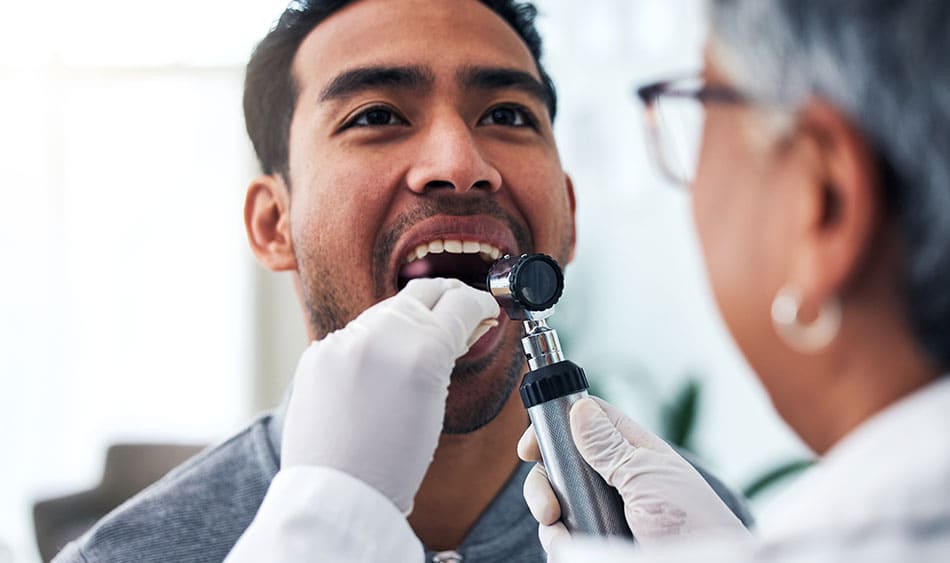Introduction
Whether you've been vaping for many years, or only just starting out, you may have noticed a sore throat, tickly cough, or a burning sensation when using an e-cigarette. You may have questions if vaping is the cause for any irritation you may have experienced, or worry about any potential impact vapes could have on your throat.
In this article, we address common throat side effects experienced with vaping alongside advice to answer why this may happen and what can be done to prevent e-cigarettes from burning, tickling, or irritating your airways and mouth. By the end of this article, you will have a much greater understanding of the effects vaping may or may not have to rule out any issues you may be experiencing.
Summary: Vaping can cause a sore throat or burning sensation but the causes are preventable. Identifying and addressing factors like nicotine strength, PG allergies, and dehydration is crucial for managing sore throat from vaping; reducing frequency or trying alternative products may help, and it's wise to refrain from vaping if experiencing tonsillitis to avoid aggravation.

Can vaping cause a sore throat?
Vaping can be enjoyed without causing a sore throat, however, there are many reasons as to why you could experience soreness or irritation when vaping. Quitting smoking is one of the leading causes that may be confused with a side effect of vaping. Other factors that can create a sore throat include the nicotine strengths you use, or the flavour, and ingredients within the e-liquids you're vaping.
Below we address why vaping can create a sore throat with the most common causes and possible ways to prevent the issue when vaping to help you improve your vaping experience and greater your chances of remaining smoke-free.
Why does vaping cause a sore throat?
There are a few reasons that can cause a sore throat when vaping. From a simple side effect of quitting smoking to vaping e-liquid with a nicotine strength too high, or being allergic to certain ingredients used within vape juice. Below we address each probably cause with guidance on how to prevent it.
A side effect of quitting smoking
When you quit smoking you may notice effects as your body goes through many physical and mental changes as it adjusts and repairs the body. Public Health England (PHE) highlights that you're likely to experience withdrawal symptoms including a cough or sore throat which will pass within 2-4 weeks [1].
Dry hit
One of the most obvious causes of a sore throat when vaping can be due to dry hits. This is when you take a draw from your e-cigarette when there is no e-liquid in the tank or pod which causes the coil to burn the dry cotton. Frequently inhaling burnt cotton can lead to a soreness or a burning sensation.
Nicotine strength too high
If you're vaping e-liquid with a higher nicotine strength than you're used to it could lead to a sore throat. We always advise starting with a lower nicotine strength when you begin vaping and increasing the strength if you feel the need to.
PG/VG Ratio
E-liquids contain two main ingredients which are Propylene Glycol (PG) and Vegetable Glycerine (VG). It's important to choose the correct e-liquid ratio for the vape kit you are using. For example, higher PG e-liquids such as 10mls or nic salts are best used with traditional lower-powered pod kits, whereas higher VG e-liquids such as shortfills are most suited to more powerful devices such as sub-ohm vape kits.
PG can also irritate the throat if you are allergic to it, side effects can also include a burning sensation or cough. However, PG is one of the most known ingredient allergies among vapers. We discuss allergies to ingredients within e-liquids below to greater understand what could be leading towards a sore throat when vaping.
Allergies to ingredients
If you're noticing a sore throat when vaping, the issue could be due to an allergy to one of the ingredients within the e-liquid. As previously mentioned, the most common allergy to e-liquids is with Propylene Glycol, although you may experience allergies with other ingredients too. If you notice irritation we advise trying e-liquids with a lower PG ratio. If you're still experiencing a sore throat with a higher VG ratio, it could also be worth testing different e-liquids from other manufacturers too.

Can vaping cause a prolonged sore throat?
If you notice a sore throat and believe it to be a direct correlation to vaping, then it's important to address what could be causing the issue in the first place. The best place to begin is by following the main triggers highlighted above and testing different nicotine strengths, PG/VG ratios, and e-liquid flavours to see if the issue continues.
Unless you manage to find an answer to what is causing a sore throat, you may notice a prolonged irritation over time. It's strongly advised to address what is irritating as it could be a simple switch of e-liquid or vape kit to prevent a prolonged issues.
Does vaping make a sore throat worse?
If you didn't already know, nicotine can cause dehydration which is also the case with vaping. In addition, PG found within e-liquid is also known to lead towards dehydration. It's important to keep hydrated when vaping, especially if you are experiencing a sore throat to prevent making it worse.
When it comes to vaping with a sore throat, only you will truly know the impact of doing so. We strongly advise refraining from anything that causing irritation, which includes vaping. If you struggle to stop vaping, then it's advised to cut down wherever possible to help speed up the recovery of your throat.
How to vape without getting a sore throat
If you have tried every other alternative with vaping, then the issue could be down to an allergy to an ingredient within the e-liquid. One of the most common allergies is with Propylene Glycol (PG) which is a main ingredient found within 10ml e-liquids or nic salts. If this is the case, then e-liquids that contain a higher Vegetable Glycerin (VG) may be best suited for you and could help prevent throat irritation when vaping.
If you've tried everything highlighted and still finding you get a sore throat when vaping then you may be best reducing the amount you vape, or the strength of your e-liquids overall. If the irritation is too much for you, then it may be worth looking at alternative tobacco-free products such as nicotine pouches.

Can a vape burn your throat?
Vaping should not burn your throat, but many reasons can lead to a burning sensation when vaping. It's important to understand what these reasons are and how to prevent them to improve your vaping experience and to avoid being put off by vaping due to reasons that could be easily prevented.
Below we discuss the most common causes of a burning vape and address how they can cause a tickly or sore throat. For the most part, the same causes of a sore throat can cause a burning feeling, although other reasons can contribute to a burning throat with vaping.
Why can vaping burn your throat?
There are a few causes which can lead to a burning sensation in your throat when vaping. For the most part, these are very similar to the causes of soreness that we previously highlighted. With this in mind, vaping could cause a sore throat if your nicotine strength is too high, you're using the incorrect PG/VG ratio for your chosen device, or allergic to the ingredients found in your e-liquid.
Vaping should not cause any sore throat or discomfort, if you're suffering from an issue when vaping then we strongly advise testing out other e-liquids to see if you can remove the issue. If you've carried out everything in this guide and you are still finding issues with vaping, then the cause could be linked to an allergy and you may find that alternative nicotine products such as nicotine pouches may work as a nicotine replacement.
Why is my vape burning my throat with a new coil?
The main cause of burning with a new coil is premature burning. If your wattage setting is too high or you have not soaked your coil adequately the coil will burn the cotton surrounding it and create a burning taste when inhaling.
The thickness of your e-liquid can also cause issues with burning if you're not using the best ratio for your vape kit. If you're using e-liquid with a PG ratio that's too high, it can evaporate too quickly and create a burning sensation. On the other hand, if you're using a liquid with a much higher VG ratio, your coil could struggle to heat the e-liquid fast enough and it could stick to the coil and create burning.
To prevent burning with a new coil we advise ensuring that you are using the correct e-liquid and adequately priming your coil before use to optimise the lifespan of your coil and to improve your vaping experience.

Can vaping cause tonsillitis?
Most cases of tonsillitis are caused by a viral infection, such as a cold or flu, with the NHS stating that "Tonsillitis is usually caused by a virus, such as a cold, but it can also be due to a bacterial infection such as strep throat" [2]. There is no current evidence to highlight the potential of vaping causing tonsillitis, however, there is the possibility of catching tonsillitis if sharing a vape with others, especially if they have a viral infection.
Does vaping make tonsillitis worse?
It's not advised to vape if you currently have tonsillitis as it could cause irritation and slow down the healing process. Although there is no direct research or evidence that highlights any impact of vaping with tonsillitis, we strongly advise that you avoid vaping if you are suffering from tonsillitis.
If you're adamant about continuing vaping with tonsillitis, then we would advise cutting down the frequency that you vape, and/or lowering the nicotine strength of your e-liquid until your tonsils begin to heal.
Is vaping bad for tonsillitis?
As discussed, there is currently no direct research or evidence that evaluates vaping in conjunction with tonsillitis. For this reason, it's best advised to minimise vaping if suffering from tonsillitis to avoid irritation. We'll be sure to update this guide with any further research if released to keep you up to date with accurate data.

Conclusion
It's clear that many factors can cause a sore throat or burning sensation whilst vaping, however they can be avoided. It's important to identify the main reason that is causing the irritation and make the changes to address it, such as adjusting nicotine levels, trying different PG/VG ratios, or exploring alternative e-liquids.
Additionally, staying hydrated while vaping is crucial to prevent dehydration-induced throat discomfort. If soreness persists, reducing vaping frequency or considering other tobacco-free alternatives may be beneficial.
There is no current research on vaping with tonsillitis or other throat infections, however, we advise cutting down on vaping if suffering from an infection or illness, especially if you notice that it is causing greater irritation.
If you notice any change in your health that causes concern or discomfort we strongly advice seeking professional medical guidance at your earliest convenience.
Frequently asked questions (FAQ)
Disposable vapes may burn your throat if they contain a nicotine strength much stronger than you are used to. If you vape a disposable vape with no e-liquid remaining you could also experience a burning sensation as you inhale burnt cotton created.
If your vape burns your throat when you inhale, it could be due to various reasons. High nicotine strength in your e-liquid can cause throat irritation if you're not used to it, however, you can also experience a burning sensation if you have not primed the coil correctly. Finally, if you use the incorrect PG/VG ratio with your device you could experience a burnt throat feeling.
Although there is no current evidence linking tonsil stones with vaping, it's important to maintain good oral hygiene and to stay hydrated to reduce the risk. Tonsil stones typically form due to the accumulation of debris and bacteria in the tonsils' crevices, so practising good oral care habits can help prevent their formation if you vape or not.
It is not advised to vape with tonsillitis as you may increase irritation which could slow down the healing process. You should stop or reduce the vaping frequency and/or lower the e-liquid nicotine strength to minimise irritation wherever possible.
Although there is no direct evidence which links vaping to strep throat, it's advised to avoid vaping or minimise use when suffering from any throat infections to prevent or reduce irritation. Although vaping may not be a cause of strep throat, it could make the symptoms worse and slow down the recovery process.
To avoid a throat hit when vaping you should consider using e-liquids with lower nicotine strengths or adjusting PG/VG ratios as higher levels of PG can be harsher on the throat. If you want to minimise throat hits, try experimenting with different vaping techniques such as slower or shorter inhales.
Vaping may cause a tickly throat for many reasons. Allergies to ingredients, improper coil priming, or using a nicotine strength that is higher than you're used to are all causes of a tickly throat. If you're struggling with a tickly throat when vaping try e-liquids with a lower strength and/or different ingredients to check how they affect you.
Yes, vaping can irritate your throat, especially if you're sensitive to ingredients like Propylene Glycol (PG) commonly found in e-liquids, or if you experience dry hits from improper coil priming. PG can cause throat irritation or a scratchy feeling for some individuals, while dry hits occur when the coil burns the cotton wick due to insufficient e-liquid saturation, resulting in a harsh, unpleasant sensation.
While there's no direct evidence that vaping causes throat infections, it's possible that vaping could make existing throat conditions worse. If you have a sore throat it's best to avoid or reduce vaping to minimise irritation and increase recovery time until healed.
|
Resources: |
|---|
Disclaimer: The content on www.royalflushvape.co.uk offers general insights about vaping and vape related products. Please be aware that this information is not meant to be a substitute for medical advice and should only be relied upon when explicitly referenced. We make no guarantees regarding the accuracy, reliability, or health-related advantages of the content displayed across all pages of our website, including blog posts, product pages and social media content.



